Teaching vocabulary to preschoolers is not just about giving the definitions and some examples, but about creativity and fun techniques to practice the words with them. One of the best and practical ways to teach them vocabulary is using games. Here are some of them.
Categories
This game helps children to categorize the words in the columns, to get their meanings and to find a relationship between these words. For each category, you can use flashcards (fruit, vegetables, clothes, sports, etc) and give a list of different words to your kids (banana, skirt, apple, tomato, tennis, baseball, shirt, shorts, kiwi, etc.).

out the odd word
This game is a bit similar to the previous one because it is again related to categorizing. Here the teacher gives a list of words, asking kids to cross out one odd word from each line. For example:
- November, July, September, October
- Cold, snow, January, summer
- Monkey, banana, apple, kiwi
- Run, tennis, baseball, football
- Taxi, car, bus, house
How many?
Here all you need is to show a picture of different things (animals, fruit, vegetables) and to ask your younger learners to count how many things there are in the picture.
2-litre jar
This is a fun game to play with your kids. You show them a 2-litre jar and ask to come up with words that can be placed in this jar. For example, they can say coffee, candle, but they cannot say happiness or animal, because they cannot be placed in this jar.
I spy
One might call this game an old one, but my younger learners adore it. To begin the game choose an object and give some hints to your kids, such as: “I spy something that is big and blue”. The pupil that guesses the word takes a turn to spy something and let other kids guess.
Apple Pass
Get your kids to sit in a circle. You can use a real apple or a fake one. While you pass the apple to the next student, you must say one English word. The student then throws to another student and says a different English word. The student who fails to catch the apple or to say a word is out. And the game continues until you have one winner. It can be played with different categories, such as fruit, vegetables, animals, etc.
Touch
This game is all about giving some instructions. The teacher says: “Touch the board”, “Touch the chair”, “Touch something black”, etc. And young learners go around the classroom to find the appropriate objects and to touch them.
Basketball
Make a paper ball and prepare a box where your kids can throw an imaginary ball. Show a flashcard to the first student. If they say the right word and throw the ball into the box, they get two points. But if they fail to do one of these things, they get just one point. The person who gets the most points is the winner.
Pictionary
This is a nice activity for recycling vocabulary. You can play this game in groups. Tell one of the students a word and ask him/her to draw a picture of it on the board. The first student to guess, what the picture is, gets a point and takes a turn to come up to the board and to draw the next picture.
Line True or False
Put a line of tape on the floor and make appropriate signs for «True» and «False». Show a flashcard and say its word (you can say a wrong word). If students think that you have said the correct word they jump on to the True side, if not they jump on to the False side. The student who gives the wrong answer is out.
What games do you play with your preschoolers?
10000+ результатов для ‘games for kids’
Family for kids
Совпадающие пары
Дошкольник
1-й класс
2-й класс
3 класс
English
family
family for kids
family members
mother father
Цифры
Ударь крота
китайский язык
ESTC for kids
Даты
Сопоставить
Easy Steps to Chinese for kids 3A
Fun for Flyers. 24
Диаграмма с метками
4-й класс
5-й класс
6 класс
Начальная школа / начальная
Средняя школа
Среднее образование
English
English for kids
Fun for Flyers
YEL
young English learners
Fun for Flyers. 28
Угадай буквы
4-й класс
5-й класс
6 класс
Начальная школа / начальная
Средняя школа
Среднее образование
English
English for kids
Fun for Flyers
YEL
young English learners
3F Questions about games Solutions Pre-Intermediate
Откройте поле
adults
kids
teenagers
teens
determiners
english
grammar
quantifiers
solutions
Speaking
unit 3
vocabulary
3F
English
many much
pre-intermediate
Questions
solutions
solutions pre-intermediate
speaking activity
unit 3
Video games
Fun for Movers. 54
Совпадающие пары
4-й класс
5-й класс
6 класс
7-й класс
Средняя школа
Среднее образование
English
English for kids
Fun for Movers
YEL
young English learners
Fun for Flyers. 15
Угадай буквы
4-й класс
5-й класс
6 класс
Начальная школа / начальная
Средняя школа
Среднее образование
English
English for kids
Fun for Flyers
YEL
young English learners
Fun for Flyers. 36
Групповая сортировка
4-й класс
5-й класс
6 класс
Начальная школа / начальная
Средняя школа
Среднее образование
English
English for kids
Fun for Flyers
YEL
young English learners
Fun for Flyers. 35
Пропущенное слово
4-й класс
5-й класс
6 класс
Начальная школа / начальная
Средняя школа
Среднее образование
English
English for kids
Fun for Flyers
YEL
young English learners
Fun for Flyers. 53
Викторина
5-й класс
6 класс
7-й класс
Средняя школа
Среднее образование
English
English for kids
Fun for Flyers
YEL
young English learners
Fun for Flyers. 42
Сопоставить
4-й класс
5-й класс
6 класс
Начальная школа / начальная
Средняя школа
Среднее образование
English
English for kids
Fun for Flyers
YEL
young English learners
Fun for Flyers. 19
Совпадающие пары
4-й класс
5-й класс
6 класс
Начальная школа / начальная
Средняя школа
Среднее образование
English
English for kids
Fun for Flyers
YEL
young English learners
Fun for Flyers. 44
Сопоставить
4-й класс
5-й класс
6 класс
Начальная школа / начальная
Средняя школа
Среднее образование
English
English for kids
Fun for Flyers
YEL
young English learners
A list of fun English word games for kids to help improve children’s spelling, reading, and vocabulary. This list of word games for kids includes word games that encourage conversation and early literacy that you can play on the spot or prepare yourself with just some paper and pencil.
Why are Word Games Good For Kids?
Word games and vocabulary games for kids are great because they get kids talking and using language while having fun. When you make a learning activity fun, kids don’t realise they are learning.
For reluctant learners, playing these word games can help and motivate them to want to play and learn more.
*This post may contain affiliate links, read more here.
10 Fun Word Games for Kids
Many of these word games for kids can be prepared easily at home with materials you already have. However if you don’t have time to prepare your own, you can also purchase a range of fun word games for kids HERE.
1. Hang Man

Probably one of the most popular word games for kids is the popular Hang Man. Player 1 thinks of a word and Player 2 has to guess it before they get “hung.”
Player 1 writes spaces for letters are written on the page so they know how many letters there are in the word. Player 2 proceeds to choose a letter they think may be in the word.
If it is correct Player 1 writes the letter down where it goes. If it is incorrect Player 1 draws part of the “hangman”. If the drawing is complete by the time Player 2 guesses, then Player 1 wins.
2. I spy
A really easy and fun word game for kids is I spy. You don’t need anything for this game except your imagination.
Player 1 thinks of a word and tells the others the first letter. “I spy with my little eye, something beginning with __” The other players need to guess the word. Whoever wins gets to be the spy!
This is a really great car game for kids too and helps to build vocabulary.
3. Bingo
Such an easy word game to prepare for kids. There are some really good versions on Amazon HERE. You can purchase the game, or use it as an example to make your own.
Draw a square grid on a page and choose a theme. Write out some words using the theme. Eg, beach: swimming, sand castles, water, sea shells, dolphin, sunbeds, picnic etc.
Make an extra copy of the words ensuring there are a few extra than the amount on the page. Cut them up into squares and put in a bowl scrunched up.
Take turns in pulling out a word and reading it out loud, then finding it on your page. The first person to find all of the words calls out Bingo and is the winner.
This fun word game for kids helps with reading and talking aloud.
4. Word Family Game
This game requires children to rhyme. Select one word and everyone needs to write as many words as they can that rhyme with that word. Eg. If the word is “Cat”, answers could be: hat, bat, rat, sat etc.
This is a great word game to help build kids vocabulary and help their language skills.
5. Word Search
Another fun but challenging word game for kids is a word search. Draw a grid of 10 x 10 squares and place as many words as you can within the grid. Words can go up, down, or diagonal, and letters can overlap to be used more than once.
Create a list on the side or bottom of the page of the words you have entered. Then once you cannot fit anymore words in, fill the blank boxes with random letters.
Kids will need to find the words as quick as possible. This can be a fun word game to do individually or as a team. For kids who like to compete, you can make identical grids and see who finishes first.
This word game encourages persistence and helps to improve their literacy skills.
6. Unscramble the words
A simple word game for children that will get them really thinking! Write a list of words down on paper but scramble the letter order while writing. Kids will need to look at the letters and try to work out what the word is and guess it.
This can be quite a competitive word game, but it helps to really get their mind ticking.
7. Scategories
While this is also an official board game, (which you can find online here) you can also make it yourself quite easily. Each player has a piece of paper and pencil.
Select 10-15 categories. These can be anything you like but remember they should be popular enough that you can guess something with most letters. Eg. Country, Movie, Body Part, Actor or Actress etc.
Once you have your categories it is time to choose a letter. Without a dice, the easiest way is to write the letters randomly on a piece of paper.
Then one person closes their eyes and points to a letter. When the letter has been chosen, players have 2 minutes to fill in the gaps with something in each category starting with that letter.
Winner is the one with the most filled in at the end, or the first to finish.
This is a really fun and competitive word game for kids that helps to improve their vocabulary, spelling, and conversation skills.
8. Words within a word
This word game requires kids to create their own words. Choose one really long word with at least 8-10 letters. The longer the better.
The aim of this word game is for kids to try to make a list of small words out of the letters of the long word. So for example the word COMPUTER includes: put, cot, term, core, mop, top, pet. Etc.
This is a really fun word game to help children’s spelling skills.
9. I am going on a picnic
A fun word game to help with your child’s memory and to get them talking.
One person starts and says “I am going on a picnic and I will bring some… fruit”
The next person says what the first person said, and adds something of their own. “I am going on a picnic and I will bring some fruit, and some sandwiches.
The next person says what the first, and second person said, and adds something of their own. “I am going on a picnic and I will bring some fruit, some sandwiches and some ice-cream.
You continue on and on and it gets more difficult to remember everything. We usually can get to at least seven or eight, and surprisingly my pre-schooler can often remember more than me!
This conversational game helps with memory, and also learning new vocabulary.
10. Story prompts
This word game involves making up a story by taking turns in saying sentences. One person starts the story, and says the first sentence. The second person continues the story with another sentence, and so on.
The stories can become very interesting as each person has different ideas. Bilingual flashcards are great for this or you can find a great version online HERE.
This conversation activity helps kid’s imagination, as well as building their vocabulary.
Other Fun Learning Resources for Kids?
If you love these English word games, check out these posts!
English Classroom Games – To play in class or at home
Knock Knock Jokes – To get the kids laughing
Best Board Games for Kids – Educational and fun
Top Book Sets for Kids – For all ages
Which English word games do you play with your kids?
These fun English word games for kids can be played with children of all ages and also with adults just by adapting certain aspects of the game to suit the age of the player.
This list of word games for kids will keep kids entertained for hours on end without feeling like they are actually learning.


Word games for kids are a great way for children to learn new vocabulary in a fun way. This list of word games includes a range of spelling games, and vocabulary games for kids that will get them talking and help their language development.

Word Games and Vocabulary Games for Kids
Word games are a fantastic way to get your kids learning when they don’t realise it. These types of games help to build vocabulary, learn to spell, and communication in general. They are also really fun and most of them can be played almost anywhere.
If you are looking for board games that you can buy, check out our board games for kids post. These word games below don’t need much preparation, but if you don’t have time to prepare your own, you can also purchase a range of fun word games for kids HERE.
1. Hang Man

The Game: Arguably one of the most popular word games for kids is Hang Man. This word game can be played with minimum 2 players and is perfect for kids to practice their spelling. Player 1 thinks of a word and Player 2 (or more) has to guess it before they get “hung.”
How to Play: Player 1 writes down a line for each letter of the word they have chosen, so that the other player/s know how many letters there are in the word. Player 2 needs to guess a letter they think may be in the word. If the letter is correct Player 1 writes the letter down on the line or lines. If it is incorrect Player 1 draws part of the “hangman”. If the drawing is complete by the time Player 2 guesses, then Player 1 wins.
2. Words within a word
The Game: This is a great word game for kids that requires them to create their own words out of one large word.
How to Play: Choose one really long word with at least 8-10 letters. The longer the word the better. Then set a timer for 1 minute and start. Each player needs to try to make a list of small words out of the letters of the long word. So, for example the word COMPUTER includes: put, cot, term, core, mop, top, pet. Etc. This is a really fun word game to help children’s spelling skills.
3. I spy
The Game: A really easy and fun word game for kids that doesn’t need any materials at all and can be played anywhere is I spy. Guess what the person “spies”. Play this guessing game with as many players as you want in the car, on a walk, or even at dinner.
How to Play: Player 1 looks around and chooses an object that he or she can see then proceeds to say, “I spy with my little eye, something beginning with __” The other players then need to guess what the word is. Whoever guesses the correct words is next up to spy. Great game to play in the car.
4. Unscramble the words
The Game: This is a simple word game for children that needs a little preparation, but will get them really thinking. Kids will need to unscramble the letters to solve the word.
How to play: Write down a list of words on a page, but scramble the letters so that they are not in order. Kids will need to look at the scrambled letters to try to form the word. For younger children, it can be simple 3-4 letter words, for older ones to make it more challenging try some 5-8 letter words. This is a great vocabulary game for kids of any age that will really test their problem solving skills.
5. Bingo

The Game: Bingo is such a fun and easy word game for kids. There are some really good versions on Amazon HERE. That you can buy, but you can also just make up your own. Kids must find the words on their bingo card and be the first to cross them all off.
How to Play: Draw a square grid on a page and choose a theme. Write out some words using the theme. It could be colours, shapes, animals, or even their sight words they are learning at school. For a group of players, make sure that all of them have slightly different words.
Make an extra copy of all of the words on every page then cut them up into squares and put in a bowl scrunched up. You and the kids can then take turns in pulling out a word and reading it out loud. Whoever has the word on their page covers it with a token). The first person to find all of the words calls out Bingo and is the winner.
6. I am going on a picnic
The Game: An old favourite, and a fun word game to help with your child’s memory and to get them talking. One person is going on a picnic and each person has to say what they are bringing along, but with a twist! The more you play this vocabulary game the better you get at it.
How to Play: This game can be played with 2 or more people. Player 1 starts with saying “I am going on a picnic and I will bring … (and chooses an item, eg sandwiches”
Player 2 then repeats what the first person said, and adds something of their own. So, for example “I am going on a picnic and I will bring some sandwiches, and some strawberries.
Player 3 (or back to player 1) then repeats what the first person said, then the second person, and adds something of their own. So for example “I am going on a picnic and I will bring sandwiches, strawberries, and a picnic rug.”
You keep going like this for each person around the circle and as you go, it gets more difficult to remember every item. The game ends when someone cannot remember them all.
7. Alphabet
The Game: Another simple vocabulary for kids to get them thinking is the Alphabet game where you go through the alphabet to name different subjects.
How to Play: Write down the letters A-Z on paper, and then choose a subject such as animals or places. Kids need to then go through the alphabet using each letter to write down something from that subject. For example, Ape, Bear, Cow, Duck, etc.
The person who has the most at the end is the winner. This word game can also be played out loud if you don’t have paper, taking turns with each player going through the alphabet until someone cannot continue.
8. Word Family Game
The Game: This fun vocabulary game requires children to rhyme and think of new words. It can be played with 2 players or even a group.
How to Play: Choose one word to start with, and then everyone needs to write as many words that rhyme with that word. For example if the word is “Mat”, answers could be: cat, sat, rat, pat etc. If you are playing in the car or on the go, you can do one word at a time. If you have paper, then start with a list of words and go through them all with a timer. The person with the most words wins.
9. Word Search

The Game: A fun but challenging word game for kids that encourages persistence is doing a word search. Kids need to find the hidden words within a grid.
How to Play: You can find lots of fun word searches online for free and print them out (as the one in the image above) Or you can make your own easily by drawing a grid of 10 x 10 squares. Once you have your grid, place as many words as you can within the grid. Words can go up, down, or diagonal. For older kids who need a challenge, make some letter overlap and used more than once.
Make sure to create a list on the side or bottom of the page of the words you have entered so the player knows which words to find. Once you cannot fit anymore words in, fill the blank boxes with a range of random letters.
10. Story prompts
The Game: This is a great vocabulary game to get kids talking and sparking their creativity by making up stories together.
How to Play: Kids need to take turns in saying sentences to make a story. Player 1 starts the story, and says the first sentence. Player 2 continues the story with another sentence. Player 3 (or back to Player 1) continues the story again with another sentence and so on. The stories can become very interesting as each person has different ideas.
Other Fun Learning Games for Kids
If you love these fun word games for kids then you may be interested in our other posts that are also educational and help kids with their vocabulary and communication.
- Best board games for kids
- Best car games for kids
- Best kids activities to do at home
- Fun and simple science experiments for kids
- Nursery rhyme lyrics
Best word games for kids of all ages
These word games will certainly encourage your kids to use new vocabulary and improve their spelling too.
The best thing about these word games for kids is that they can can be played with children of all ages. Even parents can join in the fun too. Just adapt the game to suit the age of the player. Let us know if you have a favourite word game for kids that we haven’t listed so we can try it out!
Follow Mum’s Little Explorers on Facebook for more inspiration and if you are in Melbourne, come join the Melbourne for Kids Facebook Group.

Image: Shutterstock
One of the most effective ways for young children to gain knowledge and develop crucial abilities is through play. So, if you’re in search of some fun and educational activities to do at home, word games for kids are the perfect option to keep your little one engaged. This game also makes learning at home enjoyable and lays the foundation for successful school learning. Moreover, word games assist your kid improve their vocabulary, spelling, grammar, writing, reading, verbal, and communication skills. Parents can study alongside their kids as children like having their parents participate in their learning. In this post, we present you with a list of fantastic word games that kids and adults may enjoy together. Read on.
Benefits Of Word Games
If you are wondering why word games for children are beneficial, here are some reasons:
- Develops vocabulary
- Improves fluency in the language
- Hones comprehension and reasoning skills
- Develops a love of words and reading
- Sparks their imagination and memory
- Improves their problem-solving skills
- Encourages creativity
- Serves as a great pastime for the family
- Stimulates the brain
- Improves concentration
There are many word games for kids that help them learn new words. These games are entertaining and educational, making them enjoyable for everyone involved.
We have listed the 20 best word games for kids. These games will ensure you and your children have a great time learning new words.
1. Hangman

Image: Shutterstock
Hangman is a fun paper and pencil guessing word game for kids that can be played between two players. More players can participate and take turns as well. It is a simple game where a stickman is hanged if a player fails to get the word right.
Age group: 6 to 10 years
No of players: 2
How to play:
- Take a sheet of paper and a pen and draw gallows.
- The first player thinks of a word and draws dashes above the gallows equal to the number of letters in the word.
- The other player starts guessing the letters one by one.
- If the letter the player says is in the word, the first player writes it in the corresponding spaces on the dashes.
- If the letter is not in the word, the first player draws one part of the stickman, starting from the head and followed by the body, hands, and legs.
- If the stickman gets completed before the second player guesses the word, that player loses.
- Switch sides and start again.
- Proper nouns or slang words are not allowed.
2. Name the animal
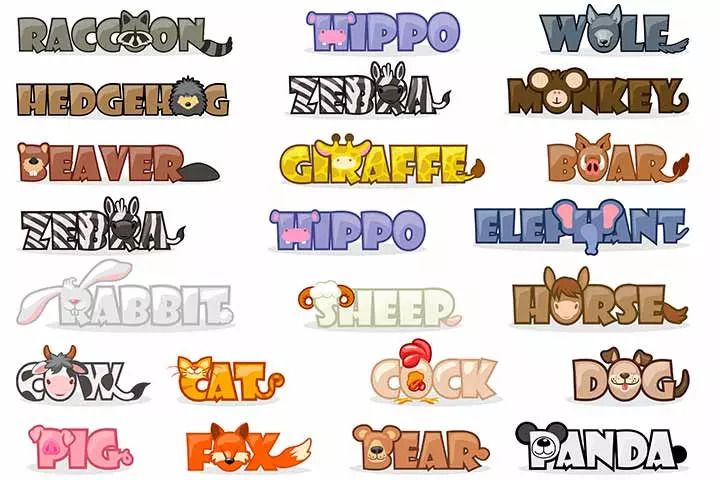
Image: Shutterstock
Name the animal is a multiplayer kids word game that can help teach your children animal names and improve their reasoning skills. This game also offers your child the opportunity to exercise their lateral thinking skills.
Age group: 4 to 7 years
No of players: 2 or more
How to play:
- You can be the host of the game.
- Make a list of common animals and a list of words that rhyme with these animal names.
- Call out each player and present them a rhyming word, and let them guess the animal name. You can say things like, “I rhyme with fog. I am a …..”
- The player who gets the maximum words correct is the winner.
- You can also teach them animal sounds by substituting animal names with their sounds.
3. I spy

Image: Shutterstock
I spy is one of the easiest games of the lot. All you need is your imagination and some eager players.
Age group: 4 to 6 years
No of players: 2 or more
How to play:
- Locate an object, and tell your child its first letter saying, “I Spy an object starting with the letter ….”
- Your child looks around and recognizes each object corresponding to that letter.
- Stop when they get it right and continue the game with the next player.
- You can also mention the color or shape of the object and let your child guess it correctly.
4. Make a word
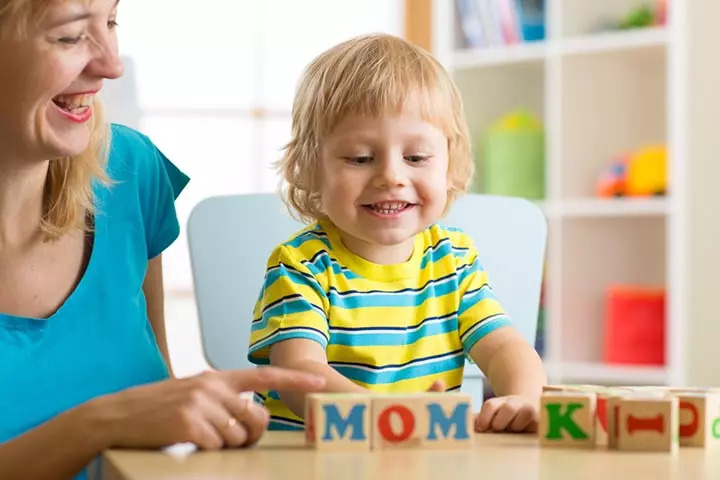
Image: Shutterstock
If your child is starting to learn new words, this word game for kids is useful. You can also play this game with older kids to make them learn difficult words and improve their memory. This game lays a solid foundation for playing advanced spelling games, such as Scrabble.
Age group: 4 to 12 years
No of players: 2 or more
How to play:
- You can play this game with younger children if you have magnetic letters, plastic letters, letter mats, or letter blocks.
- Give them a set of letters and ask them to make two- or three-letter words with them.
- For older children, you can play the game mentally or write a set of letters on a piece of paper and ask them to make as many words as they can from them.
- You can even play a timed version of the game with older children as they enjoy a good challenge.
5. Rhyming words
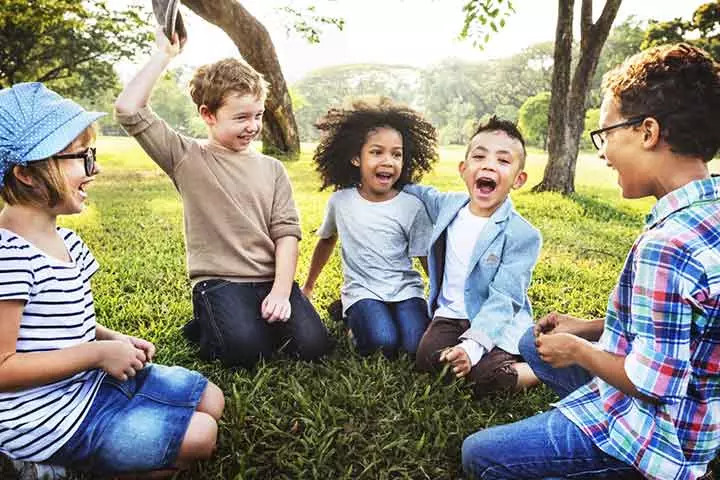
Image: Shutterstock
Rhyming Words game is a variation of Name the Animal. This word game for kids encourages your child to learn new words and helps hone their reasoning skills.
Age group: For ages 3 to 6 years
No of players: 2 or more
How to play:
- Name any animal.
- Ask your children to say the words that rhyme with the name of the animal, in turns.
- For example, when you say the word “dog,”your children should come up with words such as fog, hog, and log.
- Continue with a player until they run out of words and repeat the game with the next player.
6. Name, place, animal, thing

Image: IStock
You might remember playing this game as a child yourself. This game helps in expanding your child’s knowledge and memory.
Age group: 5 years and above
No of players: 2 or more
How to play:
- Give each player a sheet of paper and a pencil.
- Say a letter of the alphabet and start a timer.
- Each player must write the words of a name, place, animal, or a thing starting with that letter. For example, if the letter is A, a player may write, “Alex, Australia, Ape, Apple,” under each of these categories, respectively.
- You can assign different letters to different players or the same letter to each one.
- You can include other categories as per your convenience.
7. Hink pink
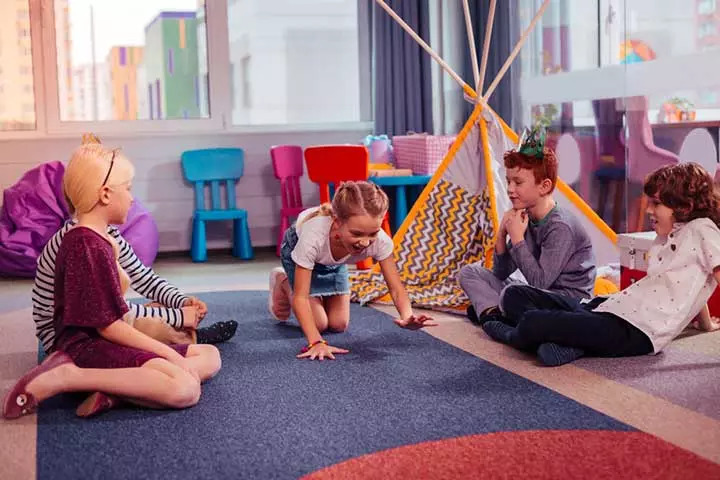
Image: Shutterstock
Children love this game. This word game for kids is designed to maximize fun while learning new words and their meanings. The game can help improve your child’s ability to solve crossword puzzles and cryptic crosswords.
Age group: 4 to 12 years
No of players: 2 or more
How to play:
- Ask each player to come up with a set of rhyming monosyllabic words, e.g., fat rat.
- Help them make a clue about their words. In this case, the clue will be “a rodent that is not thin.”
- Each player says their clue aloud, and the others try to guess what the rhyming words are.
- If the children are older, you can play Hinky Pinky (two-syllable words) or Hinketty Pinketty (three-syllable words). You can even make different combinations between different syllabic words.
- Ask the children to act out the words too so that all of you have lots of fun while the children learn difficult words.
- Here are some more words to get you started: Thin Pin, Big Pig, Tan Pan, Fan Man.
8. Guess the correct word
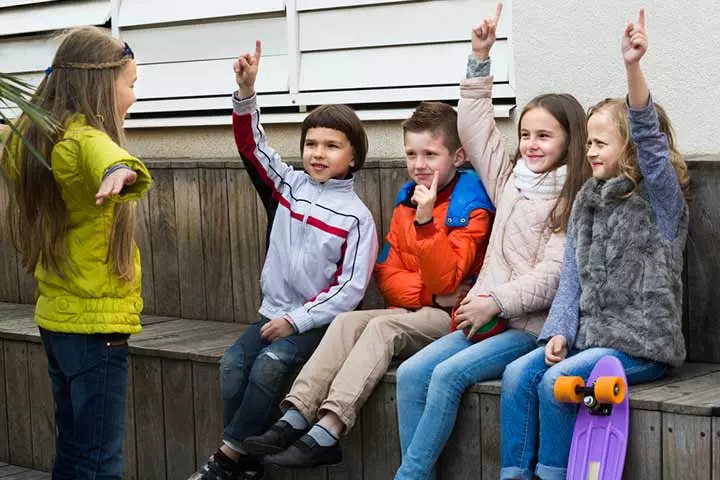
Image: Shutterstock
This word game for kids, if played mentally, is an excellent way to boost your child’s memory. It is a simple game and can be played with pencil and paper if you want to keep score.
Age group: 6 years and above
No of players: 2 or more
How to play:
- The first player thinks of a word and announces its first letter and the number of letters in the word to the others. If the player has thought of the word “Bananas,” they should say B and 6.
- The other players have to guess the word using these clues.
- If a player says another word but it has some matching words with the original word, the first player will say that the word is wrong but there are matching letters in the correct places or the wrong places.
- The next player uses these clues to make the next guess.
- You can keep the words simple or difficult according to the age of the children.
- As for the example of Bananas:
Player 2: Bullock
Player 1: That is incorrect
Player 3: Bahamas
Player 1: That is incorrect, but the As are in the correct place,
and so on.
9. Word hunting
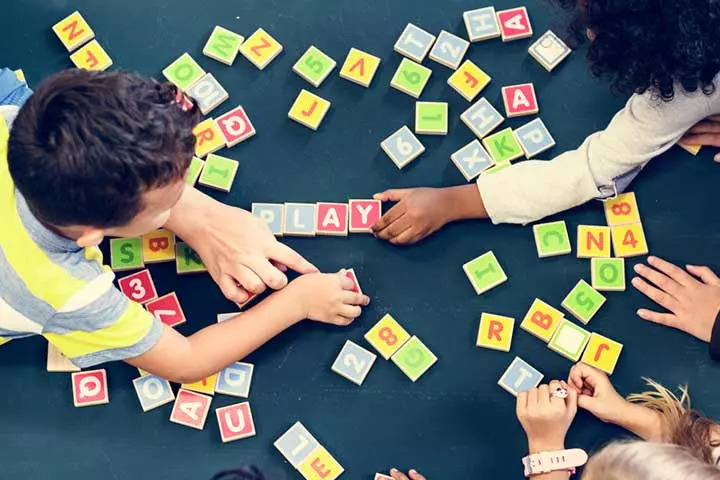
Image: Shutterstock
If your child is just learning the alphabet, this is an easy game to play. However, you can make some minor changes and tweak it for older children.
Age group: 4 to 7 years
No of players: 2 or more
How to play:
- Scatter magnetic letters, plastic letters, or letter blocks on a table.
- Ask your child to pick up a letter from the lot.
- For older children, you can write three- or four-letter words on little chits of paper and do the same procedure as above.
- For children who can read, you can ask them to pick words they see outside shops, etc.
10. Change one letter
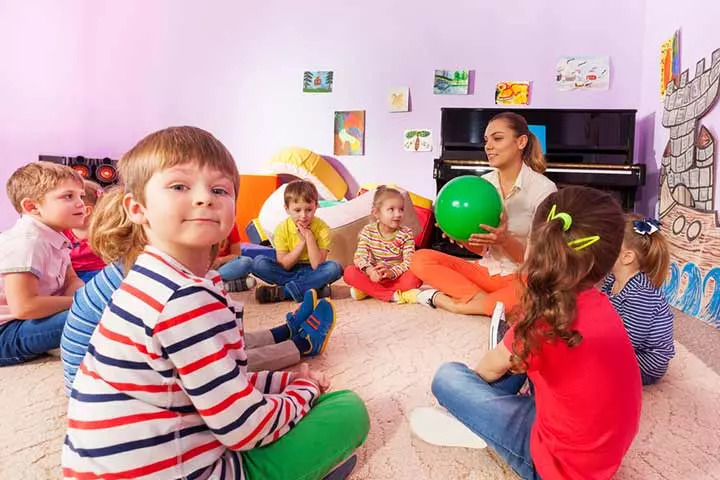
Image: Shutterstock
This is a great word game for school children. The game promotes out-of-the-box thinking and allows your child to come up with new words and even their meanings.
Age group: 5 to 10 years
No of players: 4 or more
How to play:
- Begin with a short word that has three, four, or five letters (according to the age of the children).
- Ask the children to take turns in calling out new words by changing just one letter of the previous word. E.g., park – part – dart – dark / mark – mare – mart / cart – care – case – cast – mast (and so on).
- You can set a timer or divide the players into teams to make the game more exciting.
11. Call my bluff
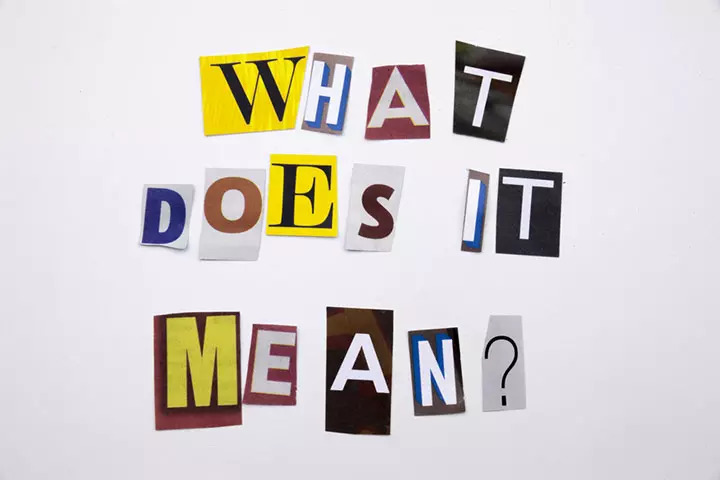
Image: Shutterstock
Call my bluff is commonly played at sleepovers and during picnics and is an excellent word game for older children.
Age group: 8 years and above
No of players: 4 or more
How to play:
- Divide the children into teams.
- Give them a set of words that are common but unfamiliar to them.
- Ask each team to look up the meaning of each word, and make up two wrong meanings for each word.
- Each team asks the other team the meaning of a word and gives them the three options.
- If the opposite team guesses the correct meaning, they get points. If they don’t, the team that asked the meaning gets the point.
- For example, let us take the word “Bewildered.” You can give three choices (a) to be left in the wild, (b) shocked or surprised, and (c) out-of-control behavior.
12. Unscramble the words
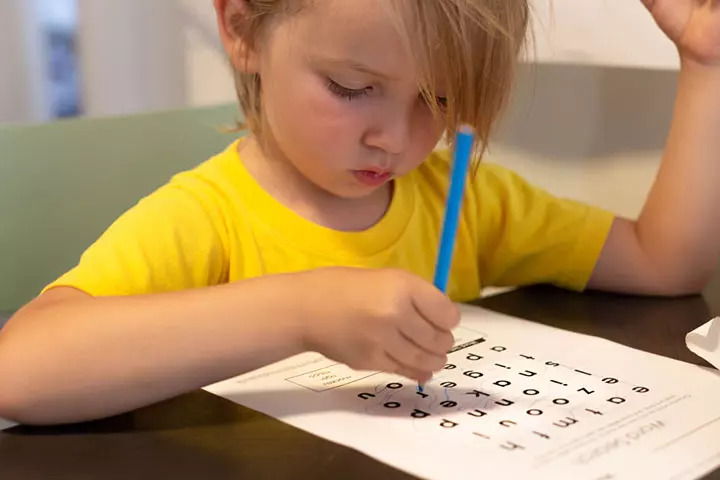
Image: Shutterstock
Let your children put on their thinking caps and play this game. The word game makes your child think and helps stir their imagination and improve their reasoning skills.
Age group: 5 years and above
No of players: 2 or more
How to play:
- Think of a word and write it down on paper but in a scrambled form.
- Your child has to think and arrange the word in the right sequence.
- You could even give clues so that they can unscramble the word faster.
- You could also write down a set of scrambled words, set the timer, and ask them to solve as many as they can within the allotted time.
13. Tell me a story
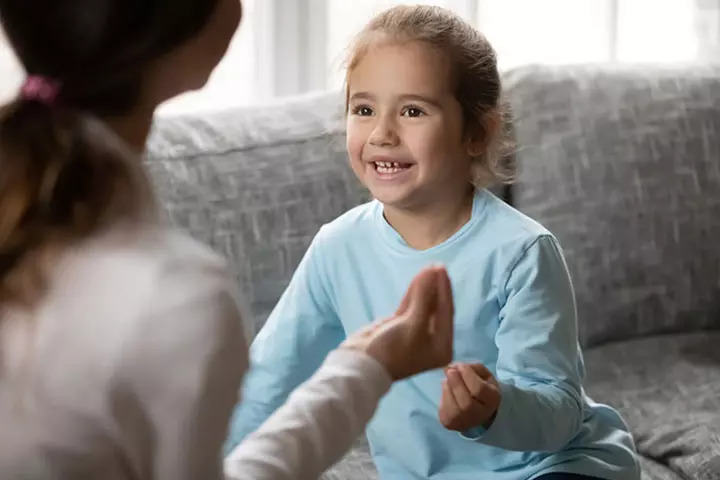
Image: Shutterstock
Children are incredibly imaginative. Children, as young as three years old, start making imaginary stories. You can play this game to fire your child’s imagination.
Age group: 5 years and above
No of players: 2 or more
How to play:
- Start a “story” with a sentence.
- The next player should say another sentence and continue the story.
- As the story grows, it becomes hilarious and absurd.
- For example, you start with the sentence, “In a village, there was a man named Joe.” The next player can say, “He wore a red shirt every day,” and the next player may say, “One day, a bull charged at him,” and so on.
14. Words in a word
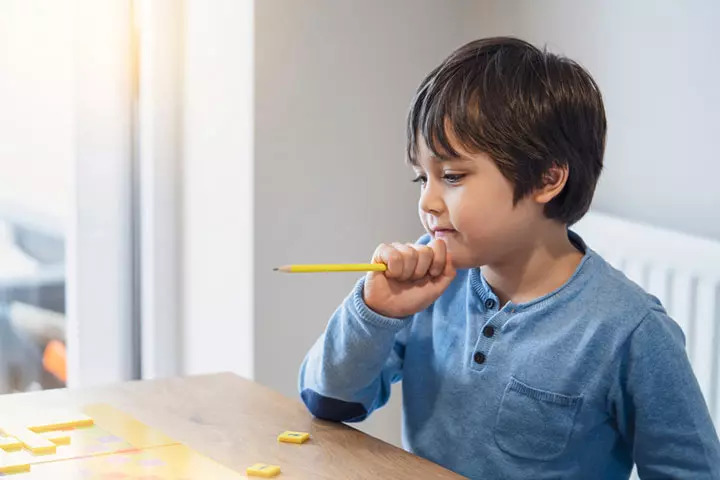
Image: Shutterstock
This is one of the most popular word games for kids and one of the best word-building games of all time. It is useful in improving your child’s English, if it is not your native language. You might have played this game in your childhood. It is now your children’s turn to play the game and keep the tradition alive.
Age group: 5 years and above
No of players: 2 or more
How to play:
- Think of a long word. A popular word choice for this game is “Constantinople.”
- Ask your child to write words starting with each letter in the word. They should use the letters contained in the word only.
- For example, Constantinople can have words such as con, cot, on, oil, no, nap, sit, and sip.
- You can set a timer and ask your child to write down as many words as they can within the given time frame.
15. I’m going on a picnic
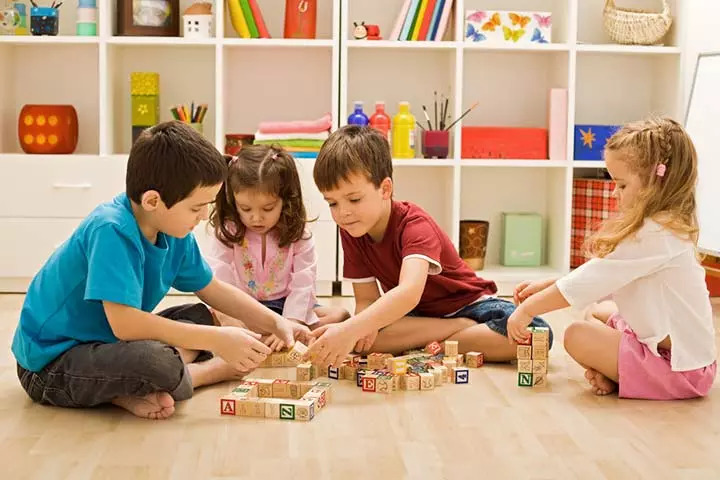
Image: Shutterstock
This game is for older children. It helps hone their creative skills and improves their memory. The word game is usually played in classrooms, but they can play it at a sleepover or even with you as a family game.
Age group: 5 years and above
No of players: 3 or more
How to play:
- The first player starts by saying, “I’m going on a picnic, and I will bring a ….”.
- The next player adds an item to the list and repeats the words.
- Each player has to repeat the items named in the exact sequence.
- If a player forgets a name or the sequence, they are out of the game.
- You can either start the game all over again or ask the next player to pick up the sequence and continue.
- For example, the game goes as follows:
Player 1: I’m going on a picnic, and I will bring a cookie.
Player 2: I’m going on a picnic, and I will bring a cookie and a Popsicle.
Player 3: I’m going on a picnic, and I will bring a cookie and a Popsicle and a bottle of juice, and so on.
16. Crosswords
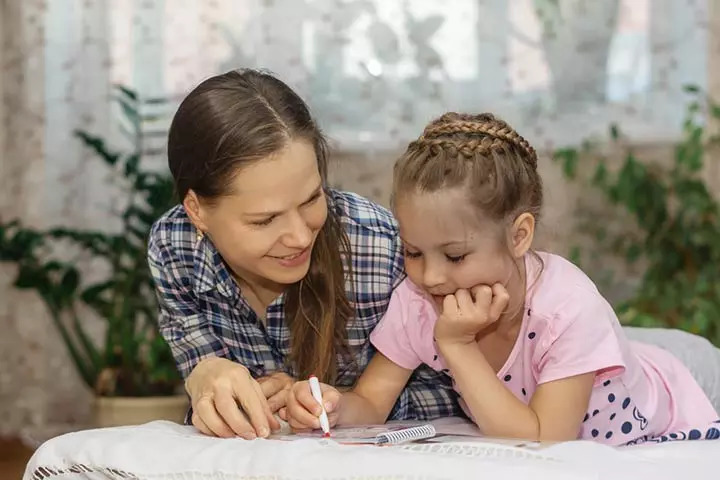
Image: Shutterstock
Solving crosswords requires practice and a lot of patience. The game will not only teach your children new words but also develop their deductive reasoning skills to a great degree.
Age group: 6 years and above
No of players: 1
How to play:
- Draw a grid with white and black squares and number each row and column.
- Then, write a set of clues at the bottom of the grid with the corresponding row or column number.
- Ask your child to solve the crossword.
- You can set a timer to make the game challenging.
- You can get some printable crosswords with clues easily on the Internet (you will find some free and printable crosswords in this link). Crosswords regularly appear in newspapers and magazines.
17. Word quest
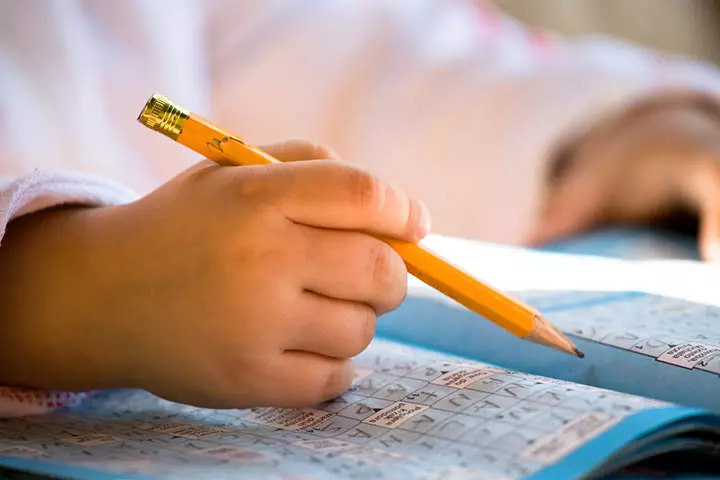
Image: IStock
Word quest is a word game for older kids. The game involves searching for words using single letters and makes your children use their deduction skills.
Age group: 5 years and above
No of players: 2 or more
How to play:
- Draw a 10×10 or 12×12 grid on a sheet of paper and divide it into squares.
- Write various words below and to the side of the grid.
- Write random letters in random squares.
- Ask your child to fill in the grid using the words you have written outside the grid.
18. Consequences

Image: Shutterstock
This word game helps stir the imagination and encourages creativity. The game works well with both children and adults.
Age group: 5 years and above
No of players: 2 or more
How to play:
- The first player writes down a sentence on a sheet of paper and passes it on to the next player.
- The next player writes the next sentence and passes it on.
- Once all the players are done with adding their sentences, you can read out the story.
- You can also write 4–5 sentences with open endings on a sheet of paper and hand them over to each player. Each player writes their version of the story and reads it aloud at the end of the game.
- For example, you can write, “There was a man named …….. He …………. a woman named ……………. They went to …………. He said, “…………………” She said, “……………………” And then, ……………..” and so on.
19. Scrabble
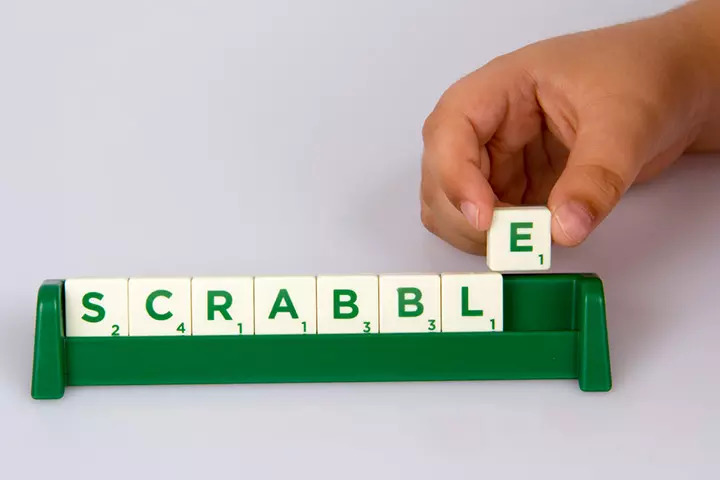
Image: IStock
Scrabble is a popular classic word game for kids. If you want your child to learn new words, this is one of the best games.
Age group: 6 years and above
No of players: 2 or more
How to play:
- Get a scrabble boards.
- Set it up and read the rules.
- The number on each letter tile tells you how many points it’s worth, and the squares on the board tell you how many points you scored.
- The player who gets the maximum score is the winner.
- After a game of Scrabble gets over, the board looks similar to a crossword.
20. Pass the bomb
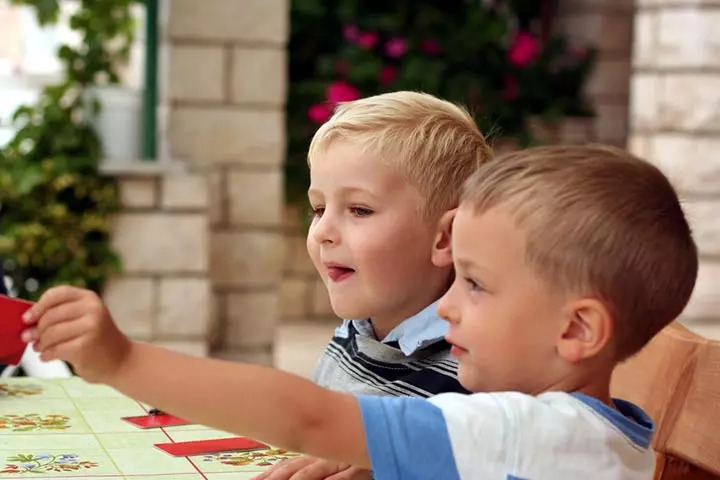
Image: Shutterstock
Pass the bomb is an educational game that will test your child’s alacrity. The first player should say a word and pass the bomb as quickly as possible to the next player, who must say a similar-sounding word. The players need to be quick in passing the bomb before it explodes. You can get this board game at a shop or simply make your own set.
Age group: 5 years and above
No of players: 2 or more
How to play:
- Take a set of card papers and write two- and three-letter words on them with a marker.
- The first player picks up a card and passes it around.
- The “bomb” goes off after a certain time. If you have made the cards at home, you can use a timer or even play music.
- The moment the timer goes off (or the music stops), the player holding the card is out.
- However, before leaving, they have to say a word that contains the word written on the card.
- For example, if the card has “ART” written on it, the child who gets out can say a word with ART in it, such as part, mart, or cart.
1. How can word games help children improve their spelling skills?
When children engage in word games, they are required to focus on the spelling of various words, which helps them to learn and remember the correct spelling of those words.
2. In what ways can word games help children with their grammar?
Word games encourage children to think about language playfully and engagingly, making it easier to understand and remember grammar rules. Word games can also help expand children’s vocabulary, an essential component of good grammar. By learning new words and their meanings, children can improve their ability to express themselves clearly and accurately.
3. How can word games help children improve their vocabulary?
Word games are an excellent way to improve children’s vocabulary skills, as they help them learn new words and reinforce their understanding of familiar ones. Games such as Scrabble, Boggle, and crossword puzzles challenge children to think critically and creatively about words, requiring them to use problem-solving skills to develop new words and find hidden ones.
4. How can word games help children become better readers?
Word games can help children become better readers by improving their vocabulary, spelling, and comprehension skills. Such games require children to identify and create words, helping them to recognize new words and understand their meanings. This eventually improves their reading skills.
When education is imparted as activities and games, children tend to grasp it much faster and retain it longer. So, if you want your children to have great communication skills, fluent vocabulary, and fascinating imagination, involve them in word games for kids. Games, such as I spy, make a word, or hink pink, are effective in keeping children engaged and sharpening their grammar and vocabulary. Another good thing about these games is that you can be involved in playing too. So, choose a suitable word game according to your child’s age and have fun while playing.
Key Pointers
- Word games stimulate the brain to improve reasoning skills, vocabulary, and language skills.
- Spur creativity through games such as I spy, rhyming words, and hink pink.
- Test the memory with games such as guess the correct word and make a word.
Was this article helpful?
The following two tabs change content below.
- Reviewer
- Author
-
HOME
-
-
GAMES
-
-
WORD GAMES
Login as parent/teacher to assign this.
Free Online Word Games for Kids
Free Online Word Games for Kids
Every day, more and more technology is being brought into the classroom. By having children play games on computers at home, they will already know the basic workings of a computer. For example, they will know how to efficiently use a mouse and will have a basic understanding of the letters on the keyboard. Because of this, children will become more engaged in the classroom, and in turn, more successful in their future.
The games keep children’s attention longer than if they were reading from textbooks. During game play, children concentrate on their next move or work on solving a problem. It helps increase their visual attention span, while they learn important new words.
Problem solving skills are another benefit of word puzzle games. Children need to think of what comes next, or what happens if they make a particular move. If a child spells a word wrong, he or she will have to go back and try again. Most of the time, children use the process of elimination to help them spell unfamiliar words.
Word Games To Build Vocabulary and Spelling Skills
Turtle Diary has many fun games that will help your child to practice and reinforce vocabulary and spelling skills without getting bored or feeling stressed about the process. When you begin to read, students will need to practice their sight words again and again to gain that recall. Sight words cannot be sounded out with normal phonetic pronunciation, so playing any of Turtle Diary’s Sight Word games, like Spell the Sight Words, will help your student to find success in their reading and vocabulary skills. It also helps that Turtle Diary has auditory options that will read students anything they need to hear within the game. Whether they are Flipping Cards or building Word Ladders, kids are sure to enjoy playing as they master their vocabulary skills. The more they are able to recognize the words, the easier it will be to spell them in games like Spell the Sight Words.
When working with vocabulary, students will love doing Animal Crosswords with hints about the missing animals, which encourages vocabulary recall and spelling skills. With a wide variety of animals and topics, your kids will love playing so much they won’t even realize the skills they’re building with each click.
For more advanced readers and spellers, Turtle Diary has Spelling Words that specifically practices words at their level before they are ready to move up to a more advanced game like Word Scramble, where they have to unscramble words, or Hangman, where they choose letter by letter to spell a mystery word before a monkey is drawn. Word Searches can also reinforce letter recognition and spelling skills as well as logic. No matter what game you choose on Turtle Diary, your child will be gaining invaluable skills for their literacy journey.
What are some fun word games for kids?
If you’re looking for some fun word games, check out one of our biggest hits: Word Scramble. It’s designed for students in 1st-4th grade. A picture provides a clue, and kids unscramble the letters provided to create the word.
Watch out though- there are extra letters to make the game a little more challenging! Scrabble is another fun word game. This classic game is just as fun online as it is playing around the table with your family
Can kids play word games online?
The internet is full of engaging word games that kids can play. Online word games are an incredible tool because they can be played on almost any device anywhere you have an internet connection. These online word games are a perfect way to develop vocabulary, spelling, and phonics skills while they have fun!
What are some easy word games?
An early reading skill is recognizing familiar sight words, and this sight word game provides practice, with levels ranging from pre-K to third grade. Another easy word game is our word ladder game. Students create a word ladder by changing one letter at a time, using picture cues to guide their work.
Where can I find free word games for kids?
All of the word games on TurtleDiary.com are free! You can choose games to focus on a variety of skills, including reading, writing, speaking, listening, grammar, vocabulary, and pronunciation. Our games are created with a focus on elementary age students in grades pre-K through fifth grade.
Our Educational Resources
-
Math Games
- Addition
- Area and Perimeter
- Decimals
- Division
- Fractions
- Geometric Shapes
- Geometry
- Money
- Multiplication
- Numbers
- Probability
- Roman Numerals
- Statistics
- Subtraction
- Temperature
- Time
- Units of Measurement
-
Language Arts Games
- Adjectives
- Adverbs
- Alphabet
- Capitalization
- Compound Words
- Conjunction
- Contractions
- Determiners
- Noun
- Parts of Speech
- Phonics
- Preposition
- Pronoun
- Reading
- Sentences
- Sight Words
- Spelling
- Verb
- Word Family
-
Science Games
- Animals
- Biology
- Earth and Its Resources
- Energy
- Food Chain
- Force
- Magnets
- Matter
- Plants
- Simple Machines
- Solar System
- The Human Body
- Water Cycle
- Weather and Seasons
-
More Games
- Fun Games
- Hangman Games
- Jigsaw Puzzles
- Logical Puzzle
- Map Games
- Picture Games
- Typing Games
- Word Games
- Word Search Games
- Geography Games

